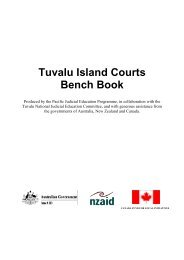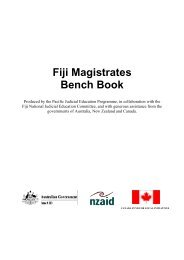Codes of Judicial Conduct in the Pacific - PacLII
Codes of Judicial Conduct in the Pacific - PacLII
Codes of Judicial Conduct in the Pacific - PacLII
Create successful ePaper yourself
Turn your PDF publications into a flip-book with our unique Google optimized e-Paper software.
Def<strong>in</strong>itions<br />
“Judge” is used <strong>in</strong> its widest sense to <strong>in</strong>clude any Judge, Commissioner or Justice <strong>of</strong><br />
<strong>the</strong> Peace.<br />
“Appearance” is to be judged from <strong>the</strong> view po<strong>in</strong>t <strong>of</strong> a reasonable member <strong>of</strong> <strong>the</strong><br />
community.<br />
In determ<strong>in</strong><strong>in</strong>g what a reasonable, fair m<strong>in</strong>ded and <strong>in</strong>formed member <strong>of</strong> <strong>the</strong><br />
community might th<strong>in</strong>k a judge may take account <strong>of</strong> his or her knowledge <strong>of</strong> <strong>the</strong><br />
community’s values and customs.<br />
1. Independence<br />
<strong>Judicial</strong> <strong>in</strong>dependence is essential to <strong>the</strong> rule <strong>of</strong> law and <strong>the</strong> fair<br />
conduct <strong>of</strong> trials. It is for <strong>the</strong> judges alone to <strong>in</strong>terpret and<br />
apply <strong>the</strong> law and <strong>in</strong> do<strong>in</strong>g so <strong>the</strong>y should be seen to be free<br />
from any external <strong>in</strong>fluence. A judge should do noth<strong>in</strong>g <strong>in</strong> public<br />
or private that might underm<strong>in</strong>e his or her <strong>in</strong>dividual<br />
<strong>in</strong>dependence, <strong>the</strong> <strong>in</strong>stitutional <strong>in</strong>dependence <strong>of</strong> <strong>the</strong> judiciary, or<br />
<strong>the</strong> appearance <strong>of</strong> <strong>in</strong>dependence.<br />
Scope and application<br />
1.1 Good governance requires that <strong>the</strong> judiciary must operate <strong>in</strong>dependently and<br />
free from <strong>in</strong>fluence by <strong>the</strong> Cab<strong>in</strong>et and public servants (<strong>the</strong> executive) or <strong>the</strong><br />
Assembly (<strong>the</strong> legislature). This <strong>in</strong>dependence is fundamental to democracy and<br />
protected by <strong>the</strong> constitution.<br />
1.2 A judge must however be <strong>in</strong>dependent and free from any and all <strong>in</strong>fluence<br />
o<strong>the</strong>r than those considerations required by <strong>the</strong> law, and to that end should:<br />
a. firmly reject any attempt to <strong>in</strong>fluence his or her decisions <strong>in</strong> any matter before<br />
<strong>the</strong> Court outside <strong>the</strong> proper process <strong>of</strong> <strong>the</strong> Court;<br />
b. not allow public op<strong>in</strong>ion or fear <strong>of</strong> public disapproval to affect <strong>the</strong> decision<br />
mak<strong>in</strong>g process<br />
c. encourage and uphold arrangements and safeguards to ma<strong>in</strong>ta<strong>in</strong> and enhance<br />
<strong>the</strong> <strong>in</strong>dependence <strong>of</strong> <strong>the</strong> Judiciary;<br />
Ker<strong>in</strong> Pillans - F<strong>in</strong>al Report - <strong>Codes</strong> <strong>of</strong> <strong>Judicial</strong> <strong>Conduct</strong> <strong>in</strong> <strong>the</strong> <strong>Pacific</strong> - Appendix 3<br />
Page 3 <strong>of</strong> 27

















